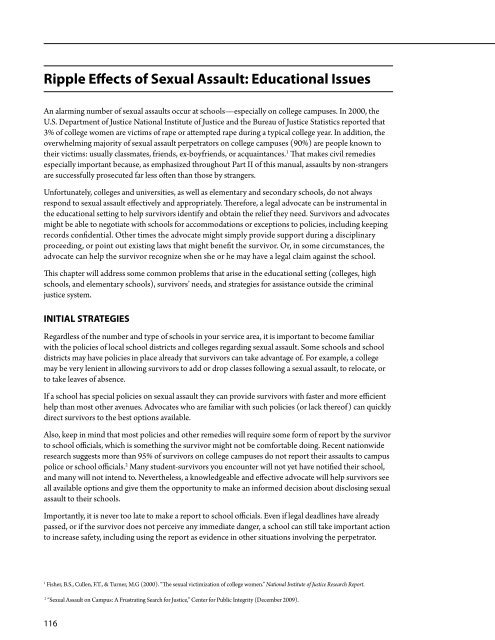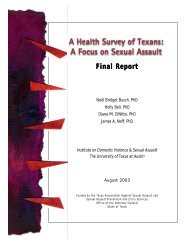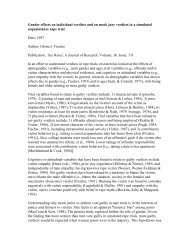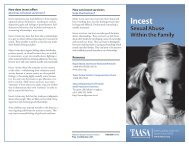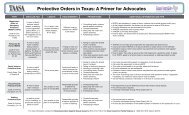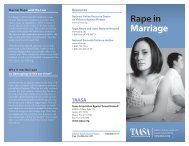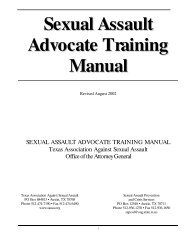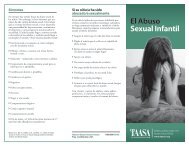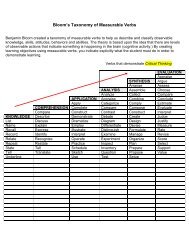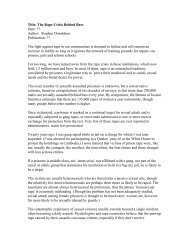Sexual aSSault LEGAL ADVOCACY MANUAL - Texas Association ...
Sexual aSSault LEGAL ADVOCACY MANUAL - Texas Association ...
Sexual aSSault LEGAL ADVOCACY MANUAL - Texas Association ...
You also want an ePaper? Increase the reach of your titles
YUMPU automatically turns print PDFs into web optimized ePapers that Google loves.
Ripple Effects of <strong>Sexual</strong> Assault: Educational Issues<br />
An alarming number of sexual assaults occur at schools—especially on college campuses. In 2000, the<br />
U.S. Department of Justice National Institute of Justice and the Bureau of Justice Statistics reported that<br />
3% of college women are victims of rape or attempted rape during a typical college year. In addition, the<br />
overwhelming majority of sexual assault perpetrators on college campuses (90%) are people known to<br />
their victims: usually classmates, friends, ex-boyfriends, or acquaintances. 1 That makes civil remedies<br />
especially important because, as emphasized throughout Part II of this manual, assaults by non-strangers<br />
are successfully prosecuted far less often than those by strangers.<br />
Unfortunately, colleges and universities, as well as elementary and secondary schools, do not always<br />
respond to sexual assault effectively and appropriately. Therefore, a legal advocate can be instrumental in<br />
the educational setting to help survivors identify and obtain the relief they need. Survivors and advocates<br />
might be able to negotiate with schools for accommodations or exceptions to policies, including keeping<br />
records confidential. Other times the advocate might simply provide support during a disciplinary<br />
proceeding, or point out existing laws that might benefit the survivor. Or, in some circumstances, the<br />
advocate can help the survivor recognize when she or he may have a legal claim against the school.<br />
This chapter will address some common problems that arise in the educational setting (colleges, high<br />
schools, and elementary schools), survivors’ needs, and strategies for assistance outside the criminal<br />
justice system.<br />
Initial Strategies<br />
Regardless of the number and type of schools in your service area, it is important to become familiar<br />
with the policies of local school districts and colleges regarding sexual assault. Some schools and school<br />
districts may have policies in place already that survivors can take advantage of. For example, a college<br />
may be very lenient in allowing survivors to add or drop classes following a sexual assault, to relocate, or<br />
to take leaves of absence.<br />
If a school has special policies on sexual assault they can provide survivors with faster and more efficient<br />
help than most other avenues. Advocates who are familiar with such policies (or lack thereof) can quickly<br />
direct survivors to the best options available.<br />
Also, keep in mind that most policies and other remedies will require some form of report by the survivor<br />
to school officials, which is something the survivor might not be comfortable doing. Recent nationwide<br />
research suggests more than 95% of survivors on college campuses do not report their assaults to campus<br />
police or school officials. 2 Many student-survivors you encounter will not yet have notified their school,<br />
and many will not intend to. Nevertheless, a knowledgeable and effective advocate will help survivors see<br />
all available options and give them the opportunity to make an informed decision about disclosing sexual<br />
assault to their schools.<br />
Importantly, it is never too late to make a report to school officials. Even if legal deadlines have already<br />
passed, or if the survivor does not perceive any immediate danger, a school can still take important action<br />
to increase safety, including using the report as evidence in other situations involving the perpetrator.<br />
1<br />
Fisher, B.S., Cullen, F.T., & Turner, M.G (2000). “The sexual victimization of college women.” National Institute of Justice Research Report.<br />
2<br />
“<strong>Sexual</strong> Assault on Campus: A Frustrating Search for Justice,” Center for Public Integrity (December 2009).<br />
116


